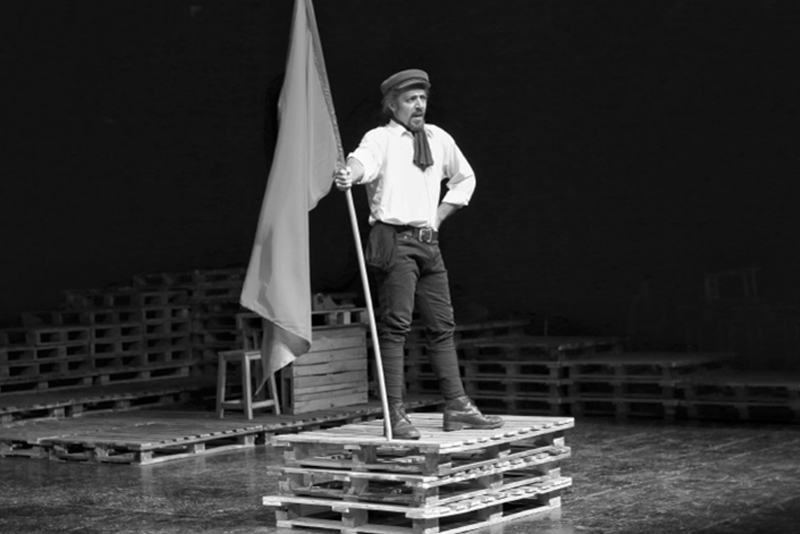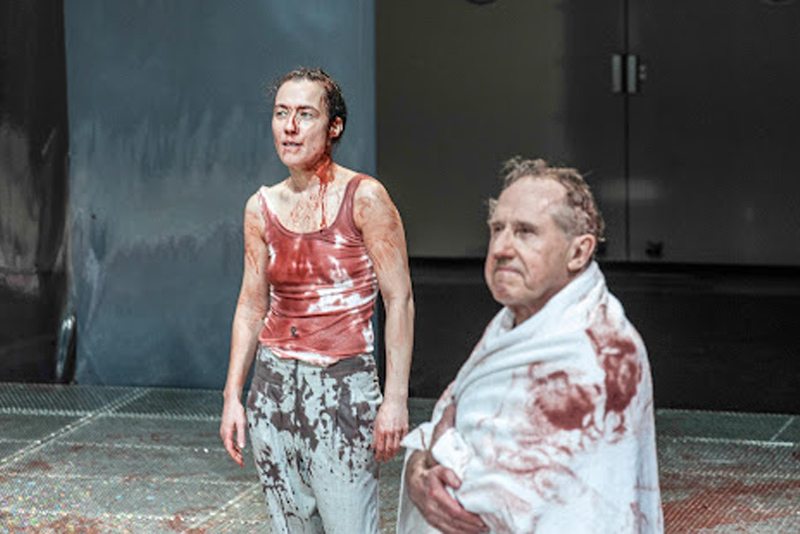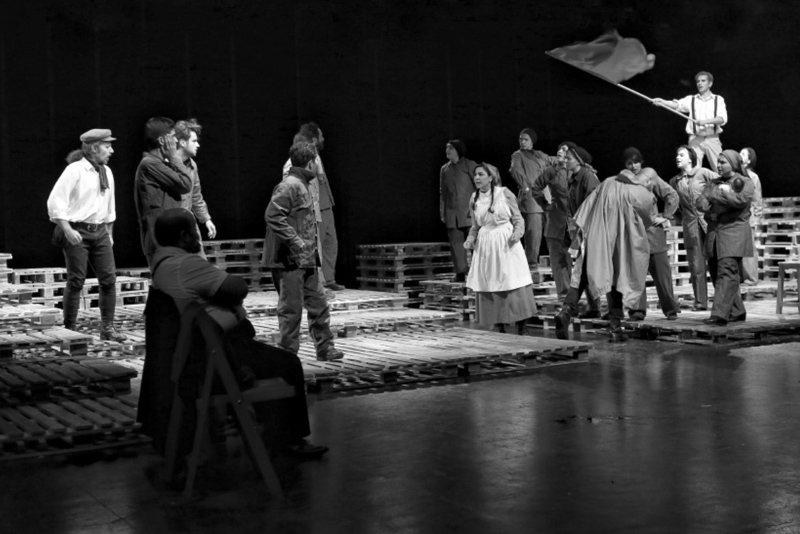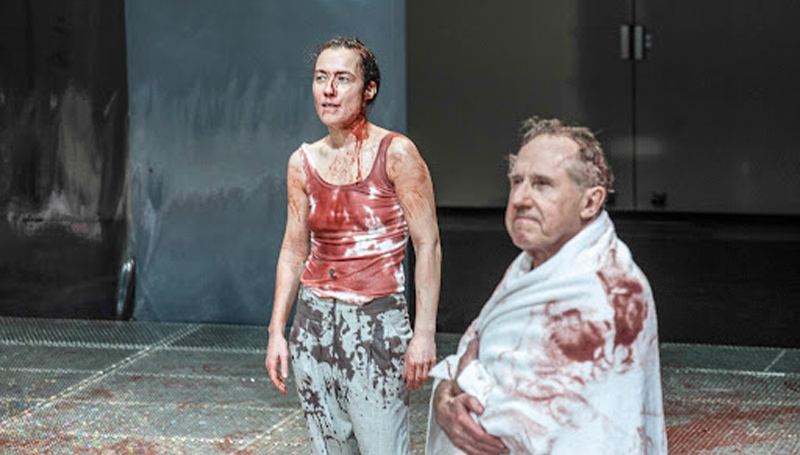Fadjr Theatre Festival, Iran
Mohammad Reza Aliakbari in Tehran
Government encounters artists: Fadjr International Theatre Festival.
Fadjr International Theatre Festival is an event where culture and politics intersect. The largest and most important theatre event in Iran, this annual festival reveals the complicated facets of the cultural situation inside the country. On this playing-field, the gap between government authority and the Iranian community of artists becomes self-evident.
Fadjr International Theatre Festival is one part of a festival series that includes music and film and which is organized to celebrate the anniversary of the revolution. Therefore it is intended to be a showcase for government powers to emphasize or manifest the nation’s cultural advances, but the results are highly unpredictable. The government cannot completely control the theatre because of the nature of this art form. While the authorities are able to control proposals for movies and supervise their production, the government is not able to completely supervise the theatres.

Mohammad Reza Aliakbari in Mephisto.
Photo credit: Mehdi Ashna.
There are too many official and unofficial productions and not enough human resources available to control all the theatres. In many cases, artists and theatre graduates themselves are instructed to review theatres and issue the permission for a production to be shown in public. And, additionally, theatre people can find ways to dialogue and come to a deal. But still there are performances which don’t get past the filters of the Board of Supervision and Evaluation. This Board works inside the framework of the Dramatic Arts Centre (which is a sub- branch within the Ministry of Culture); its main duty is to control, review, and check the content of all performances.
Certainly, the general satisfaction among theatre artists has increased, especially during the last four years. Many more companies now find a space to stage their shows. The interference of government officials has clearly decreased, but still the elected government has an effect not only on culture but also on other aspects of social life, including the media. From the very first moment the Dramatic Arts Centre announced that Dr Farhad Mohandespour was to be the festival’s director in the spring of 2017, attacks started and continued right up until the Festival opened in 2018. Mohandespour is a university professor, and thirteen years ago he experienced the same sort of attacks. As of then, he permanently stopped working as a theatre director. For a while, he was the head of the Board of Supervision and Evaluation. He remains an impressive leader in Iranian theatre circles, especially for those young and less-young generations who studied theatre and were his students at university. His return to an official position outside of the realm of the university obviously indicates that he came in to the festival management scene again because of fundamental and practical changes and reforms; he was chosen just after the presidential election when President Hassan Rouhani was elected to his second term of office.

Münchner Kammerspielen: Hamlet.
Photo credit: Susanne Brill.
The first serious attack on Mohandespour was from Nasrollah Ghaderi, the editor of the Dramatic Arts Centre’s magazine Namayesh who wrote a hypocritical article citing Mohandespour’s background as the head of the Board of Supervision and Evaluation and the director of the 2003 Fadjr Festival. The article’s negative tone caused reactions among theatre people in the country, and many artists began to write on social media and in journals in support of Mohandespour. Right before the festival opened, criticism and attacks came from television and the right-wing newspaper. Those who spoke out against the wave of criticism lost their positions as theatre managers in the current government. Nonetheless, Mehdi Shafiee, the director of the Dramatic Arts Centre, protected the festival totally, so it took place.
The Fadjr International Theatre Festival provides an opportunity for those artists who live in other Iranian cities to come to the capital and present their works. This is a very important function, because the theatre in Iran is unfortunately centralized in Tehran. And the festival is the only showcase whereby theatre artists outside Tehran might find a way to enter the mainstream. In addition, the artists already in the Tehran mainstream want their due.
Internationally, by selecting and inviting foreign theatre productions the festival organizers provide an opportunity for its Iranian participants to learn about what is going on abroad. This is very important, because for most of the local artists and the audience there are few chances to travel to other countries to see what is happening on their stages. Therefore, the festival offers a window onto different production styles and thematic concerns. During the past years, some outstanding international figures have presented at the festival, among them Eugenio Barba with his Tree (2017). (However, for political reasons he turned down the invitation to participate in the official programme and came to Tehran one week after the festival.) Thomas Ostermeier brought in his Hamlet in 2016, and Wlodzimierz Staniewski produced his Pythian Oratorio in 2014.

Münchner Kammerspielen: Hamlet. Photo credit: Mehdi Ashna.
There is no doubt that these foreign productions have an influence on Iranian theatre artists. One can’t always pinpoint their influence, but in some cases the effects are very clear: since Polish street theatre performances by the Teatr Biuro Podrozy from Poznan and Teatr KTO from Krakow took place in the Fadjr Festivals between 2008 and 2010, street theatre in Iran has developed rapidly. Both the national and the international groups are important for the government as they wish to satisfy as many of their own theatre companies as possible while also figuring among the international theatrical hotspots by inviting players from outside to come to Iran. The festival director and its organizers must take this double focus into account.
The thirty-sixth Fadjr International Theatre Festival was held from 18 to 29 January 2018 in Tehran. At first glance, l was surprised that there were so many more productions this year than in previous years: one hundred and thirty-six indoor shows and thirty-five outdoor performances. Beside state theatres, ten private theatres hosted the festival’s performances and there were offstage shows in unusual sites. Nineteen foreign productions were invited from countries including Azerbaijan, Turkey, Iraq, Georgia, Brazil, Japan, Greece, Netherlands, Belgium, Switzerland, and ltaly. There were five French companies as well as the Miinchner Kammerspiele with Hamlet, Rimini Protokoll with Remote Tehran, and visual artist Eva Mayer-Keller with her Death ls Certain from Germany.
For the first time the festival planned for some artists to be in residence, providing opportunities for young artists to work in depth with international theatre practitioners. These residencies were held in four areas of specialization: contemporary choreography, site-specific performance, multidisciplinary with the subject of water crisis (which is a serious problem for Iran’s future), and working on text. Residencies, workshops, and panel discussions of this edition were very focused, and it was apparent that the organizers were proposing new horizons to artists, theatre students, and scholars. Heiner Goebbels and Giorgio Barberio Corsetti participated in panel discussions, giving Iranian artists the chance to meet two important European directors and become familiar with their approaches and methods.
For the first time, the 2018 Festival had a “Try Out” section which gave Iranian groups with experimental approaches the opportunity to share their work-in-progress with audiences. l used this opportunity to present some aspects of my current theatrical project [Spinoza], [Us] & [Others]. It is a long-term project which I began in 2017 to develop physical and vocal techniques that I learned about during my past sojourns in Polish theatres. My colleagues and I are trying to systematize these skills so as to apply them to a scenic translation of Spinoza’s thoughts.
At the same time we are looking for themes to dramatize that have to do with the philosopher’s life and thoughts as well as his culture. I believe the philosopher and his society are pertinent to contemporary Iranian society. For example, we are using Ladino songs which belong to the Sephardic culture that Spinoza came from. So, for me it was extremely important to share some of the achievements with an audience, to listen to their feedback, and also to test some of my scenography ideas. We participated in the Try Out twice, and each time the audience reaction was very different. This is helping us to develop the project. The discussion after the presentations lasted nearly two hours; we found out where we had the answers and where we could not defend ourselves. As a theatre group, we were privileged to discover at what points in our performance we were losing our audience before developing a definitive production. The experience was so impressive that we decided to invite the Try Out audience members who acted as pure critics to attend our rehearsals occasionally.

The ensemble of Mephisto. Photo credit: Mehdi Ashna.
I was engaged in another production in the Fadjr Festival: Ariane Mnouchkine’s adaptation of Klaus Mann’s novel Mephisto. In past years, Ariane Mnouchkine and her Theatre du Soleil were invited to Iran, but Mnouchkine rejected the invitations. Anyone aware of her political and social attitudes would find it obvious why she never accepted to come to a government-run theatre festival in Iran. But finally, we as Iranians could bring her work to the stage. Mephisto had already had a forty-three day run last summer. It is directed by Masoud Delkhah, an Iranian director and university professor who received his PhD in theatre and film studies from the University of Kansas. He invited me to play the role of Otto Ulrich, a character based on the real-life person Hans Otto, a communist actor and director who worked during the 1920s and 1930s and was eventually tortured and murdered by the Nazis. For me, this character of Otto Ulrich represents all of those Iranian artists who were shot and killed, or forced to emigrate, after the revolution of 1979. It is my favourite role. The performance was very successful, but I have to confess that this was not a foregone conclusion.
Iranian audiences are tired of hearing about politics in everyday life and Mephisto is a political play, so to produce it was a risk. But it turned out that the audience saw the Iiveliness of the characters and were able to sympathize with them. It was surprising that we were able to perform Mephisto without any censorship, not even a word; the festival organizers invited us to perform it for three nights, which we did. So, Mnouchkine’s play came to the festival even if she has not yet come to Iran.
When not participating as an actor or director, I watched other festival performances. My interest in Polish theatre pushed me towards Tadeusz Rozewicz’s The Trap. It is a long play with fifteen tableaux; there is a poetic tone to it, and it is full of references to Franz Kafka’s life and at the same time seems personal – a real challenge for a director. Armin Javan who directed an adaptation of Kafika’s The Castle four years ago, this time focused on Kafka’s life and used Rozewicz’s text as a platform. Javan used the original text but then adapted a new dramaturgy to the text. By recomposing some of the tableaux and mixing characters, he tried to resonate with and amplify Kafka’s strange inner world. And by cutting some of the text and some tableaux, he underscored Kafka’s relationships with women. The performance was mostly static Kafka was on a bed and other characters moved the bed. This creative mise-en-scene exposed Kafka’s passivity towards women.

Elaheh Bakhshi, Behrouz Kazemi and Shani Roshan in The Trap.
Photo credit: Mehdi Ashna.
In The Trap, all the actors were barefoot. They were made-up so their faces looked like they were dead. When a character did not have a role in any given scene, he went over to the on-stage wall and, using stylized movements, hung himself. Javan also introduced scenes referring to Kafka’s Jewish background – a symbolic act of circumcision and the appearance of the child Franz, for instance. These scenes were definitely meant to recall the extermination camps. Ottla, Kafka’s youngest sister and his favourite, was sent to Auschwitz, where she died, in 1943.
One exciting moment during the performance was when Franz and two other characters, Max and Flice, speak simultaneously, their dialogues gathering furious momentum until gradually they start changing their language. Initially it was Persian but then it changed to Turkish and Kurdish. These are two minority languages that, in spite of there being a huge population speaking them, have no place in Iran’s official education system. This action exposed the lack of communication in Kafka’s world, and at the same time reminded me of Gilles Deleuze and Felix Guattari’s 1975 study Kafka: Toward a Minor Literature. Using these languages on stage even for a few seconds can be seen as taking a risk, but I believe that this scene was one of the most powerful moments in the whole performance. And it should be. An artist must take risks.
The offstage program was the most important achievement of this year’s Fadjr International Festival. For the first time, forty-one offstage productions performed in unusual sites and public places. Iranians who came to the festival were amazed that theatre could take place outside of buildings and specially designed halls. l don’t mean that there had never been outdoor performances before, but watching a performance in buses, gardens, and prisons is quite new for Iranians. Equally new is the idea that disabled people, prisoners, or child labourers can be given a voice by being the subject matter of performances in these public spaces.
One of the most interesting outdoor performances was directed by Rimini Protokoll (winner of the European Prize for New Theatre Forms in 2008). In his Remote Tehran, a group of forty people set off into the city wearing headphones. They were guided by a synthetic voice, the kind we are familiar with from GPS navigators. Directions coming from this artificial voice led the group to perform for and experiment on themselves. Forty people watched each other; they made individual decisions and yet always remained part of the group. Remote Tehran questioned artificial intelligence, big data, and our predictability. Rimini Protokoll tours this theatre project from city to city, and each new site-specific version builds upon the dramaturgy of the previous city.
It is none too soon for the Iranian artists who have social concerns to discover the potential of public places to create sudden and unexpected theatrical performances. It is time to break the borders radically and go offstage. l believe that an offstage programme could provide theatre artists with the chance to be courageous. The Iranian citizens who see such performances would be inspired to act more courageously themselves.
Theatre in Iran is under pressure to comply with the demands of political conservativism. For this reason, The Infertile Day, a play which had been running elsewhere for two months, couldn’t perform in the festival. It was a sad moment to hear that a group found out it was forbidden to perform literally as they were setting up for the following day’s show. Why were they censored? Because it was judged not appropriate for a festival held to honour the anniversary of the revolution to host a play that tells the story of a group of prostitutes.
Mohandespour couldn’t accomplish all the changes he would have liked. Changes and reforms take time to implement. If the Dramatic Arts Centre can resist government intrigues and keep the same director for 2019, probably we will see more changes for the better in the Fadjr International Festival. The question is, can they make these changes when Big Brother is watching them?









